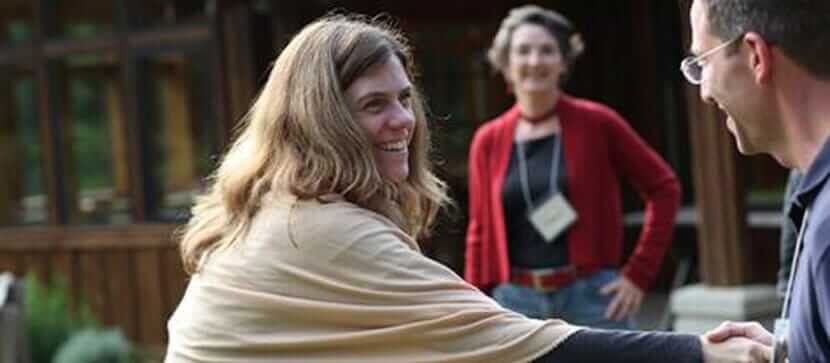In the late 1990s, Whidbey Institute faculty Sharon Parks and Larry Daloz designed and launched a new program, devoted to empowering leaders to address society’s most pressing challenges. At the 12-year mark of this flagship program of the Whidbey Institute, we spoke with them about how Powers of Leadership has grown and changed over the years, and in what ways its presence and purpose remain vital as ever.
“The program was designed with the recognition that we live during a great hinge point in history,” said Sharon, “and that it places all of us on a very steep learning curve.” The seasonal leadership retreat cycle, POL, was designed to be a cross-sector convening of individuals committed to addressing the big questions of our time through their professional roles, whether for-profit, non-profit, or in government. A complex blend of both leadership theory and practical skills, the curriculum was designed around a kind of trifecta: “cultivating the consciousness, conscience, and competence that is needed in these times.”
“Conscience is important because we all stand on new moral and ethical frontiers and these times require a certain moral commitment and courage to move ahead,” Larry added. “We have moved beyond traditional leadership, which portrays leaders as having certain traits: tough, authoritative, take-charge. Adaptive leadership, by contrast, requires an understanding of the entire system: who your partners, allies and confidantes are, where problems are arising from, and how to exercise leadership wherever you happen to be in the system. It moves beyond authority,” Larry added. “Authority itself is under assault right now,” adds Sharon, “which calls for a different understanding of both authority and leadership. While we still require authority to be effective, we need to examine, understand, and practice it differently.” Through both dialogue and individual process, participants explore such questions as how to confront critical issues within organizations, hold steady in times of change, develop both macro and micro level perspectives on relevant issues, and expand one’s personal repertoire of skills in responding to crisis and leading change while deepening one’s own commitment.
How has the world changed since POL began? “The challenges have intensified,” said Sharon. “We are now faced with greater complexity, greater diversity, and ever more moral challenges and ambiguities. Now more than ever, the cultivation of both mind and heart are necessary to enable us to step into the challenges we face as a culture.”
Embedded in the learning is respite and renewal, as well. A key feature of the program – its seasonal focus, whereby learning takes place four times per year, every four months, from fall through the following summer – was designed in part to alleviate the increasing stress and busyness experienced by professionals in every sector. More than just a retreat or workshop, Sharon said, “POL itself is an invitation to engage in contemplation, to be refreshed and inspired, and to enter a deeper consciousness of our relationship with the more than human world.”
Since Powers of Leadership was born in 1998, leadership of the program has itself evolved and shifted across the years. Larry and Sharon have now become senior fellows of the Whidbey Institute, and to this day remain involved with POL, while Craig Fleck and Christie Lynk take leadership in implementing the program with their consistent presence. “Throughout changes in POL leadership, there remains a remarkable continuity,” observed Larry. “The focus, experience, and quality of learning continue in the way they always have.” Testament to this lives in the feedback of POL II participants, who continually observe that although their reunions bring them into contact with cohorts from other years, everyone feels profoundly united by a shared experience.
This kind of transformation, inspiration, strengthening, and renewal lie at the heart the Whidbey Institute’s mission: supporting people to effect positive powerful good in a constantly changing world.

